Residents, staff and their families enjoyed a Christmas party at Steepleton Manor with a festive buffet prepared by Nick, the chef. Singing was provided by Allie Pooley and everyone tucked into warm mince pies.


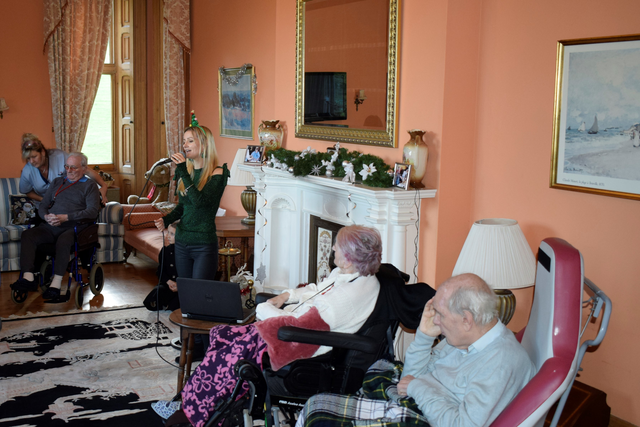
Residents, staff and their families enjoyed a Christmas party at Steepleton Manor with a festive buffet prepared by Nick, the chef. Singing was provided by Allie Pooley and everyone tucked into warm mince pies.



The team at Sherborne House and Steepleton Manor are feeling festive and ready for Christmas in their seasonal jumpers.

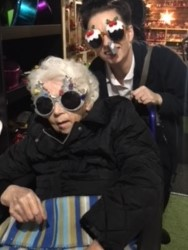
Residents at Steepleton Manor enjoyed a seasonal trip to their local garden centre which including some festive costumes. Anne, Margaret and Maggie took the opportunity to view the Christmas displays and join in the fun.



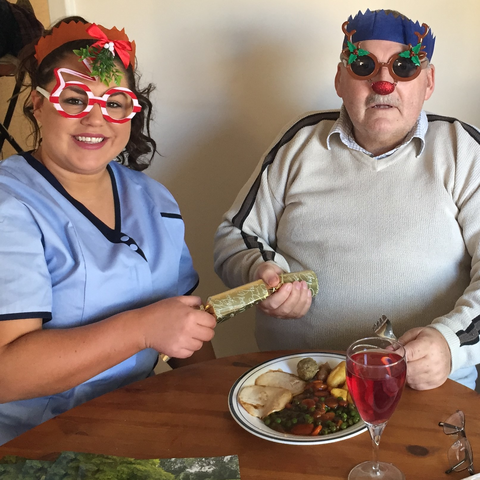
Older people in Dorset will receive a free Christmas dinner and pudding thanks to Dorset based organisation, Care at Home and Wiltshire Farm Foods.
Carer’s will visit hundreds of older people on Christmas Day to serve the seasonal meal and spend time pulling a cracker and talking to residents throughout Dorset. It means a number of older people will not be alone this Christmas.
A traditional Christmas dinner including a pudding will be provided free of charge by Wiltshire Farm Foods.
Care at Home provide a variety of care services to older people in and around Dorset and Somerset and came up with the idea to support their clients this Christmas.
Dawn McGill, from Care at Home said, “Christmas can be a lonely time for many older people and not everyone can spend Christmas with family. We visit our clients all year round to support them with a variety of daily tasks and wanted to extend that visit to include Christmas Day. Wiltshire Farm Foods very kindly offered to donate a free Christmas meal and we wanted to make the most of this by personally visiting each person and spending time with them to make their day special”.
Care at Home are part of Altogether Care, a Dorset based care provider which is a family owned business.
Free meals and visits will take place throughout Dorset and some parts of Somerset.
Photo: Hannah McDonald from Care at Home with Raymond Brunt
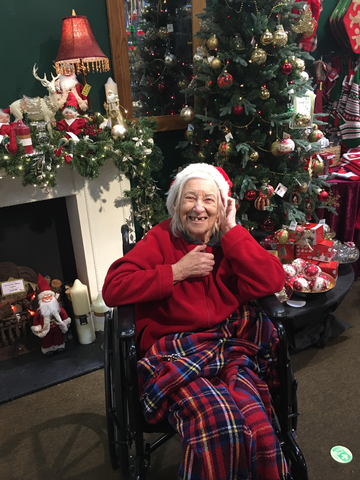



Residents at Steepleton Manor enjoyed a trip down memory lane this month with a ‘memory box’ activity. This month’s theme was ‘Noddy’.
Items relating to Noddy were passed around to the residents and each person talked about how they remembered the TV character and his adventures.
Noddy is a fictional character created by English children’s author Enid Blyton, originally published between 1949 and 1963. Noddy was illustrated by the Dutch artist Eelco Martinus ten Harmsen van der Beek from 1949 until 1953. In addition to appearing in many books, he also featured on television.

If you read an article about technology and social care the chances are that you’ll see a vision of the needs of service users being tended to by some kind of robot. All very exciting and entertaining. But missing the basic point that good care is mostly about human interaction.
Technology has instead a real value when it supports those interactions and allows more time for them to happen.
We’ve recently invested significantly in a modern care management system. It’s a mobile platform that is bringing real benefits to our team and to our residents. By taking care of routine admin tasks and ensuring that relevant details such as care plans are always readily available, we are finding that we have more time to interact and concentrate on the wellbeing of those we care for, our residents.
In selecting the software, we had some essential criteria:
The system we chose does all of this and more. Real time reporting ensures there is complete continuity during shift handovers. We also have complete audit trails for medication, liquids, nutrition and activity levels that can highlight any potential issues and suggest alterations to the required care.
The software also brings greater consistency. Procedures are aligned not only to the care plan for each individual resident but also to the CQC standards. This builds a consistent and measurable level of care for everyone. The transparency of this system is not only beneficial for relatives but also our senior managers and experts in care who are able to monitor vital signs and have an instant input when and where it is required.
The technology we’ve invested in also helps us to build a stronger care team around each person, involving families, friends and health service professionals. We’ll talk more about this in another article.
Most importantly the technology saves us time. We are investing the time released in better quality interactions with our residents to help them lead the most active and fulfilling lives possible.
If you’re looking for a care provider for yourself or a loved one, in one of our homes or yours you can find out more by visiting our website or contact us directly on 01305 300 161 to discuss in more detail how we can help you.
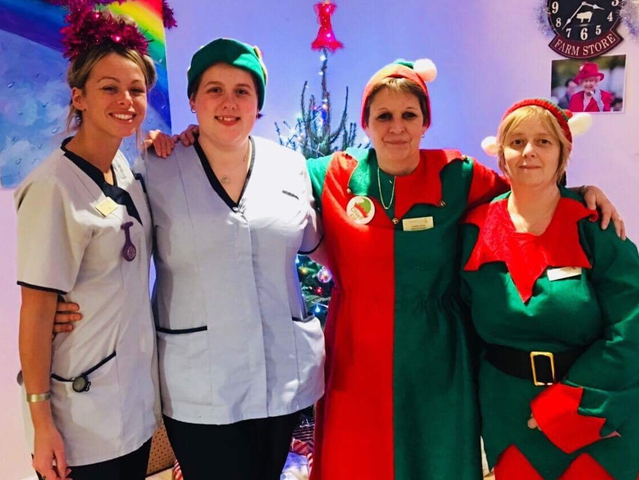
Staff took part in their annual Christmas tradition this month by dressing up as Elves to bring some festive cheer to the residents at Sherborne House.
Christmas Elves usually arrive on December 1st, sent on a special mission from the North Pole and instructed by Santa Claus to keep an eye on behaviour in the lead up to Christmas.
We hope those residents have all been good!

Direct Payments are based on the view that you are the best person to decide what care is right for you. We agree that you and your loved ones are the best people to decide what care is right for you. This principle has shaped our care services for nearly 30 years.
Under certain circumstances, instead of your local council choosing your care provider and paying for that care, you can receive money yourself to use with who you choose.
Direct Payments are optional. If you prefer for your council to arrange and pay for care on your behalf that is your choice.
Direct Payments are available to the following people:
Before claiming direct payments, you will need an assessment of needs by your local council. You can only buy equipment or help using your Direct Payments if the assessment says you need it. You must keep records of what you spend. Anything you spend on items not included in your assessment may have to be paid back.
What you can buy:
Direct payments cannot be used to buy care from your council or for long-term residential care.
To receive Direct Payments, you will need to prove that you are able to manage the money and spend it on the right things. The amount you get will be sufficient to cover only the care or equipment identified in your assessment of needs. If you would like additional support, you can buy this without it affecting your Direct Payment.
Direct Payments will not affect any benefits you receive such as child support or independent living fund payments. The amount you receive may depend on your income, but payments are not taxable.
We hope this guide will help you understand whether Direct Payments are the best option for you or somebody you care for. You can see an infographic of this guidance here or to find out more about how Altogether Care could help you contact us on 01305 300 161.

The halls will be decked this Christmas at Steepleton Manor thanks to residents who made some festive bunting this month.
Gwen, Helen, Anne and David took time out to relax and create the bunting to hang up and bring some cheer.

Of the three main strands of wellbeing: physical, mental and emotional, it is arguably emotional that is the most difficult to manage.
Emotional wellbeing is closely linked to resilience – the ability to recover from illness or deal with change or misfortune. There is also a link to how our brain function changes as we get older which can make us more susceptible to depression and mental illness, particularly if there is a genetic susceptibility.
Major life changes, such as moving into residential care can trigger anxiety and depression so programmes that monitor and nurture wellbeing are essential. Sometimes this can be as simple as activities that help people feel active and engaged. Healthy exercise and relationships are essential.
Activities that promote sensory stimulation (such as art and music), reflection and relaxation all help prevent anxiety and depression, and promote wellbeing.
Individual Experiences
Wellbeing isn’t a simple issue with a single answer. It is very much about individual experience. Care homes need to make full use of specialist support services including physiotherapy, psychotherapy, meditation and mindfulness.
And because it’s about individual experience, any interventions must be tailored to take account of individual cognitive and physical capacity as well as each person’s preferences and wishes. An intervention will have limited benefit if a person doesn’t want to take part or really doesn’t think it can help them. In these cases, it’s better to explore different types of therapy, experiences or activities.
If we look at possibly the simplest measure, exercise, you can see how it affects wellbeing in many ways:
And that’s just one type of intervention. Other interventions that have been proven to aid emotional wellbeing in residential care include reminiscence, pet therapy, gardening, yoga and dance. There are plenty of options available – something to suit everyone, in fact.
If you would like to find out more about either our care home, our care at home or our live-in care services please get in touch or visit our website for more information.
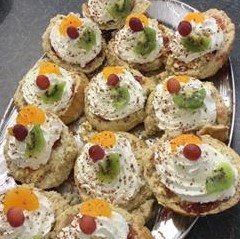
Residents at Weymouth Care Home enjoyed a seated Zumba class last month and a visit from the lovely Chloe May who sang lots of favourite songs and, as always, succeeded in getting everyone to sing along!
Special thanks are sent to Martin who made everyone a delicious cream tea.